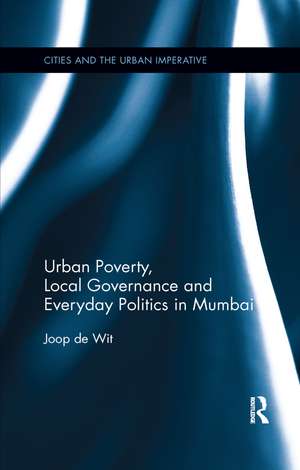Urban Poverty, Local Governance and Everyday Politics in Mumbai: Cities and the Urban Imperative
Autor Joop de Witen Limba Engleză Paperback – 25 apr 2019
| Toate formatele și edițiile | Preț | Express |
|---|---|---|
| Paperback (1) | 416.22 lei 6-8 săpt. | |
| Taylor & Francis – 25 apr 2019 | 416.22 lei 6-8 săpt. | |
| Hardback (1) | 948.21 lei 6-8 săpt. | |
| Taylor & Francis – 4 oct 2016 | 948.21 lei 6-8 săpt. |
Preț: 416.22 lei
Nou
Puncte Express: 624
Preț estimativ în valută:
79.65€ • 83.75$ • 65.81£
79.65€ • 83.75$ • 65.81£
Carte tipărită la comandă
Livrare economică 17 aprilie-01 mai
Preluare comenzi: 021 569.72.76
Specificații
ISBN-13: 9780367177416
ISBN-10: 0367177412
Pagini: 336
Dimensiuni: 138 x 216 x 18 mm
Greutate: 0.45 kg
Ediția:1
Editura: Taylor & Francis
Colecția Routledge India
Seria Cities and the Urban Imperative
Locul publicării:Oxford, United Kingdom
ISBN-10: 0367177412
Pagini: 336
Dimensiuni: 138 x 216 x 18 mm
Greutate: 0.45 kg
Ediția:1
Editura: Taylor & Francis
Colecția Routledge India
Seria Cities and the Urban Imperative
Locul publicării:Oxford, United Kingdom
Public țintă
PostgraduateCuprins
Preface. List of abbreviations. Introduction 1 Locating Mumbai‘s poor in urban governance, politics and informality 2 Mumbai megacity: city, people and governance changes 3 Included and excluded: Mumbai‘s poor and slum dynamics 4 Political entrepreneurs: the Mumbai corporators in their political and financial context 5 Politics or poli-tricks? Local democracy and slumvoting in the 2012 Mumbai municipal elections Conclusions: the poor pray for miracles, the rich think they have a right to them. Glossary. Bibliography. Index
Notă biografică
Joop de Wit is Senior Lecturer in Public Policy and Development Management, International Institute of Social Studies of Erasmus University (ISS), The Hague, The Netherlands. An anthropologist, his research interests are political science, governance, policy issues, urban poverty and decentralization. He has published the books Poverty, Policy and Politics in Madras Slums: Dynamics of Survival, Gender and Leadership (1996) and New Forms of Urban Governance in India: Shifts, Models, Networks and Contestations (co-edited with I.S.A. Baud, 2008) as well as numerous articles.
Recenzii
"De Wit notes the implications of money politics, or patronage democracy, for the infl uence of the private sector and big business in Mumbai’s governance, as well as how it limits the overall capacity of the poor to mobilise for better services. This leads to one of his most important conclusions, that examples of 'effective, sustainable common action is actually rare' (p 274)."
Tanya Jakimow, Economic & Political Weekly, Vol. 52, No. 2, 2017
"The book will be eye opening to urban planners interested in slums and urban informality regardless of how familiar they already are with the Indian context.What is clear is that, as this book argues, no policy or intervention is likely to be effective unless it is founded on a deep understanding of the political economy at play between slum communities, local politicians, and the state."
Chandan Deuskar, Journal of the American Planning Association, 2017
"Ultimately, de Wit argues that political interests of both voters and politicians are marked by short-termism, and are not ideologically grounded. He identifies several factors limiting the effectiveness of organized advocacy among slum residents, including sharp divisions between groups, weak leadership, and defensive rather than rights-based action."
Christine Ro, International Institute for Environment and Development, 2017
'…the book is rich in ethnographic data including in areas difficult to collect data on (such as the details of ward-level corruption), and so this book will be useful to scholars, researchers and students of social anthropology, urban studies, urban sociology, political science, public policy and governance, as well as urban practitioners and policymakers. It is recommended reading for scholars with an interest in mega cities development and in Mumbai in particular.'
Emiel A. Wegelin, Rotterdam
Tanya Jakimow, Economic & Political Weekly, Vol. 52, No. 2, 2017
"The book will be eye opening to urban planners interested in slums and urban informality regardless of how familiar they already are with the Indian context.What is clear is that, as this book argues, no policy or intervention is likely to be effective unless it is founded on a deep understanding of the political economy at play between slum communities, local politicians, and the state."
Chandan Deuskar, Journal of the American Planning Association, 2017
"Ultimately, de Wit argues that political interests of both voters and politicians are marked by short-termism, and are not ideologically grounded. He identifies several factors limiting the effectiveness of organized advocacy among slum residents, including sharp divisions between groups, weak leadership, and defensive rather than rights-based action."
Christine Ro, International Institute for Environment and Development, 2017
'…the book is rich in ethnographic data including in areas difficult to collect data on (such as the details of ward-level corruption), and so this book will be useful to scholars, researchers and students of social anthropology, urban studies, urban sociology, political science, public policy and governance, as well as urban practitioners and policymakers. It is recommended reading for scholars with an interest in mega cities development and in Mumbai in particular.'
Emiel A. Wegelin, Rotterdam
Descriere
This book explores the informal patronage relations between urban slum-dwellers and service delivery organisations in Mumbai, India. It examines to what extent the people in the slums are subject to social and political exclusion. Delving into the roles of the slum-based mediators and local municipal councillors, it highlights the problems in the functioning of democracy at the ground level, as election candidates target vote banks with freebies and private sector funding to manage campaigns. It provides a comprehensive overview of the various actors within local municipal governance and democracy as also consequences for citizenship, urban poverty, public services and neo-liberal politics.










